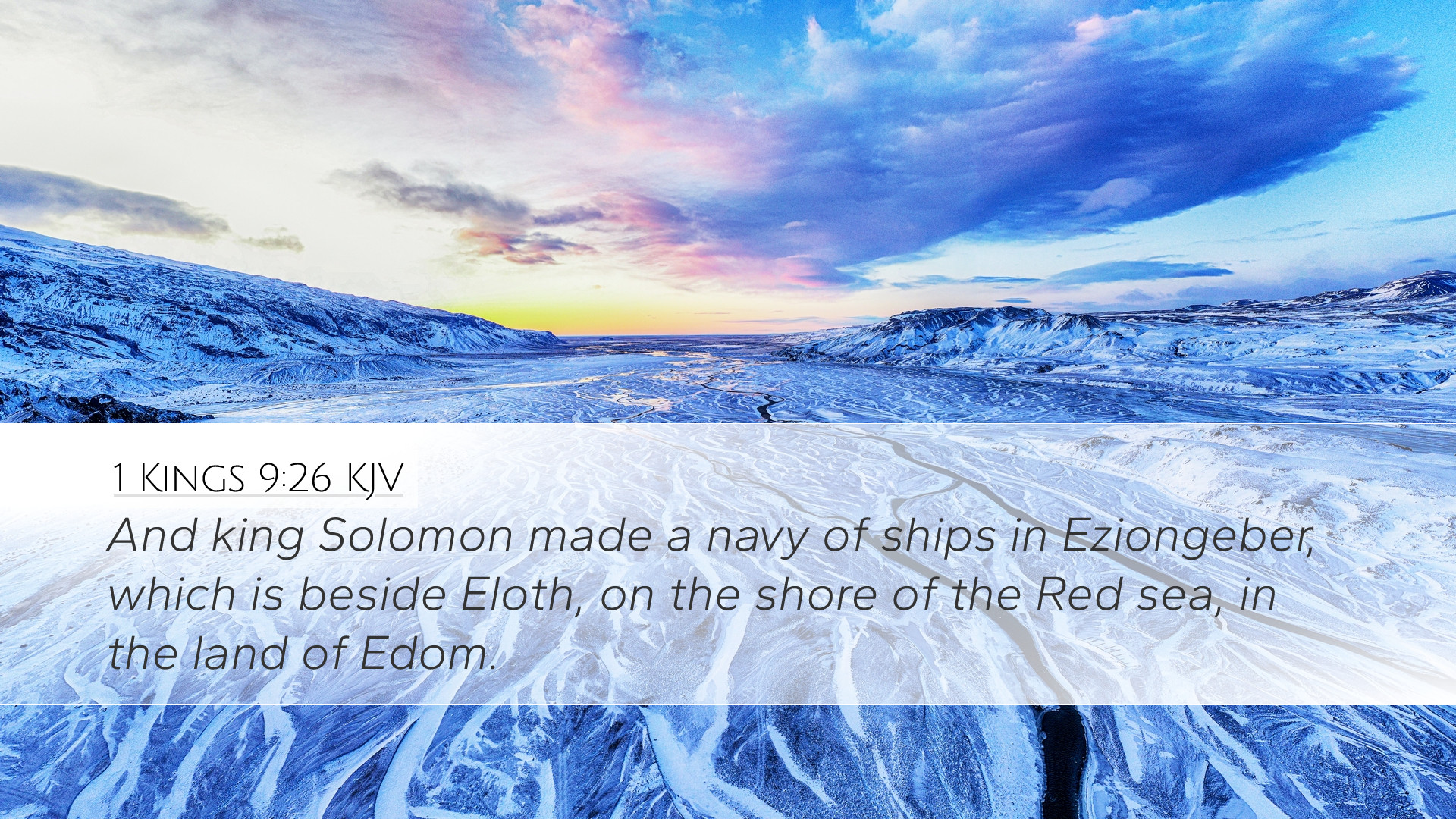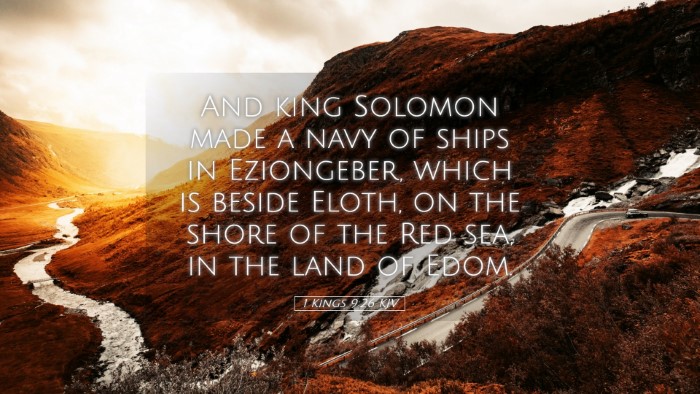Commentary on 1 Kings 9:26
1 Kings 9:26: "And king Solomon made a fleet of ships in Ezion-geber, which is near Eloth, on the shore of the Red Sea, in the land of Edom."
This verse marks a significant moment in King Solomon's reign, as it highlights his ambitions in trade and exploration. The construction of a fleet of ships represents not only notable maritime prowess but also a strategic expansion of Israel's economic and political reach.
Contextual Background
The historical context of this verse situates Solomon's reign as a pinnacle of prosperity and power in ancient Israel. Following the establishment of the temple and the nation's centralization under Solomon's rule, the king sought to further enhance Israel's wealth through trade.
- Ezion-geber: This port was located on the Gulf of Aqaba, playing a crucial role in maritime trade routes.
- Red Sea: Its navigable waters allowed for passage to distant lands, facilitating trade with nations such as Arabia and beyond.
- Eloth: Situated close to Ezion-geber, this area served as an essential site for economic exchange.
Theological Insight
From a theological perspective, Solomon's initiative can be seen as a move towards fulfilling God's promise to Israel regarding prosperity and blessing. The expansion of trade could be interpreted as an element of the covenantal blessings promised to Israel, reinforcing the idea that obedience to God leads to wider spheres of influence and economic stability.
Matthew Henry's Commentary
Matthew Henry emphasizes that Solomon's establishment of a navy was indicative of his wisdom and his desire to create a legacy. He underlines that this action was, in many senses, an investment into Israel’s future. Through maritime ventures, Solomon enhanced the security and economic power of his kingdom.
Henry points out the importance of the specific location of Ezion-geber as pivotal for maritime endeavors. He notes that these ships would allow for trade not just with neighboring nations but also with distant lands, showcasing the king's ambition to elevate Israel's status on the global stage.
Albert Barnes' Commentary
Albert Barnes provides further detail regarding the historical significance of these ships. He highlights that Solomon employed seasoned mariners from Tyre, noted for their maritime expertise, indicating that Solomon relied on foreign knowledge to achieve his endeavors. This partnership with the Tyrians not only enriched the fleet but also fostered an important diplomatic relationship between the two nations.
Barnes also comments on the political dynamics at play, noting that such efforts could leverage Israel's influence among its neighbors. The ability to control trade routes would be key in asserting dominance and establishing peace within the region.
Adam Clarke's Commentary
Adam Clarke offers insights into the specifics of shipbuilding techniques employed by Solomon. He sheds light on the craftsmanship and resources required for constructing a fleet, emphasizing that the king's ambition necessitated skilled labor and considerable foresight. Clarke notes that these maritime activities not only focused on commercial trade but also on acquiring materials essential for construction and artistic endeavors back in Jerusalem.
Moreover, Clarke reflects on the symbolic implications of Solomon's naval expansion, illustrating it as a means for Israel to reach out and engage with the world. This openness to trade mirrors the New Testament principles of outreach and engagement with diverse cultures for the sake of the Gospel, demonstrating an ancient precursor to the universal mission that would later be a hallmark of Christian identity.
Conclusion
In conclusion, 1 Kings 9:26 encapsulates a significant point in King Solomon's reign, representing his ambitions to expand Israel's influence through maritime ventures. Historical commentary from figures such as Matthew Henry, Albert Barnes, and Adam Clarke reflects on the practical, political, and theological dimensions of this endeavor.
The implications of Solomon's actions extend far beyond the maritime craft itself; they represent a desire for wisdom in governance, an understanding of the importance of economic power, and an acknowledgment of divine blessings in pursuing such ambitious plans. For pastors, students, theologians, and Bible scholars alike, this verse invites reflection on the balance between earthly ambitions and spiritual responsibilities, urging a consideration of how our pursuits align with divine purposes.


